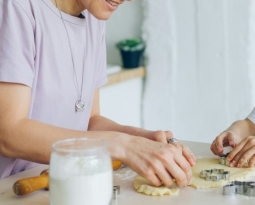By Katya J P
Being put on a waiting list for counselling can feel frustrating and difficult, so preparing yourself for the counselling process can be one way of helping your mental health before you even set foot in the therapy room.
One of the topics that will come up in therapy are patterns of behaviour, and one of these patterns that are linked closely with mental health are lifestyle patterns. Making tweaks to these patterns will not only give your mental health a boost almost immediately, it will also prepare the ground for working with your counsellor. Discovering the way, we treat and look after ourselves tells us a lot about what we think about ourselves and can give us clues as to what we might need to address in counselling.
Also finding more helpful lifestyle patterns while you wait, means the time spent in the therapy room can be directed more towards any deep-seated issues that need looking at, as opposed to sorting out the practical issues that are having an immediate impact on mental health.
So, we have a list of things you might want to look at while you wait. Don’t feel like any of this is an obligation – what we don’t want you to feel is pressure. We won’t use language like “should” and we would ask you to be mindful about “shoulding-yourself” too because that just brings in feelings of criticism and failure. These are just helpful pointers, so here are a few of ways you can use this list.
- Use it as a source of reflection – am I kind to myself, do I treat myself well, how do I care for myself? What does that say about the way I think about myself?
- What are my patterns of lifestyle? Are they helpful to me? How have I got into these habits? Do I find these habits comforting or do they have a destructive element to them?
- How can I find ways to tweak these patterns without judging myself? Can I do them without being too restrictive? Can I find ways to do this gently, so I feel the benefits without feeling pressured?
What we put into our bodies has a direct effect on anxiety, depression, mood swings, hormones, and our sleeping patterns. Before you do any of these things, if you are unsure or have particular health issues, please consult your GP. So here is our list of things to consider:
The Caffeine/Anxiety Link
How much tea, coffee, energy drinks or diet-fizzy drinks do I consume? (Tea has as much caffeine as coffee, energy drinks can give you energy crashes and Diet-Coke is like a shot of espresso!) Caffeine has been scientifically proven to produce anxious symptoms and even bring on panic attacks. Reducing these things can have a big impact on reducing anxious feelings and also helping sleep patterns and insomnia.
Perhaps make a note of every time you drink a caffeinated drink – how do you feel afterwards? Does your heartbeat faster, and do you feel more scattered and less able to focus? Are you craving these drinks? If you suffer from insomnia, see if you can start cutting out these drinks after 3pm. Take a look at the less caffeinated options out there – de-caff coffees and tea, herbal teas, or drinks with the fizz but without the caff. See how you can reduce your consumption slowly and gently, so you don’t get withdrawal symptoms.
Also, are you drinking these things in order to skip meals or to supress your appetite? Start to think about your consumption – is it filling you up in some way? Does it make you feel comforted? Is it part of a routine you enjoy? How can you keep the routine but tweak the caffeine?
Alcohol and Depression
You don’t have to have an addiction to alcohol for it to affect your mental health. Alcohol is a known depressive and its consumption can have a direct effect on your mood. Hangovers are often seen as just physical symptoms, but it can also be accompanied with low mood and depressive feelings.
Have a think about your alcohol consumption and what that does to your feelings. Alcohol is also full of sugar so it can go hand in hand with feeling energised and then having a crash, not just of energy but also with mood.
Have a think about why you drink alcohol – is it to chase away worried or difficult feelings, do you use it because you have social anxiety, do you want to fit in, is it part of a pattern or routine, is it learned behaviour from family members? Reflect on what alcohol gives you and what it might take away from you too.
Vitamins for mental health
Does your body have the right vitamin balance? Low Vitamin D (particularly due to a lack of daylight) has been linked with Seasonal Affective Disorder which comes with depressive symptoms. People with low iron can often feel fatigued and have no motivation or energy.
If you’re lacking Vitamin D, then getting out into the daylight is paramount but it can also be found in oily fish so even a simple can of sardines can do some good. Iron-rich foods include red meat, beans and lentils, dried fruit, and nuts. Getting the right vitamins into our bodies is important for good mental health so take a look at what you might be lacking. It’s best done through diet, but you can also talk to your GP if you think you might have symptoms of low levels. If you can afford it, ask your pharmacist to recommend a good affordable multi-vitamin or supplement in a safe dose to give you that extra bit of help.
Gut Bacteria for Depression
Have you heard of those adverts for yoghurts with “good bacteria”? Well, scientists have recently found that not only is good bacteria great for our immune systems, but they also found a ground-breaking link between gut bacteria and depression. If our stomachs are healthy and full of good bacteria, the bacteria send messages through the nerves to the brain to feel energised, balanced and less stressed. A person with a low-level of good bacteria will feel depleted, have an exaggerated stress response and can start to display symptoms of depression such as being unable to experience joy. A healthy gut equates to a healthy mind.
There are different ways to help the bacteria in your stomach. One way is cutting down on processed foods and takeaways and instead introducing a diet that is varied with more fruit and veg, nuts, onions, and oily fish as well as those ‘live good-bacteria’ yoghurts, pickled foods are great for a healthy gut-biodome. (Bacteria love anything vinegary!)
Fuel Intake and Low Mood
A healthy gut also comes from eating regular meals. Skipping meals and yo-yo eating can not only create havoc with our health but can also be a major factor in anxiety and mood-swings. Have you noticed how you can get more irritable when you are hungry? Our food intake levels have a direct correlation with our hormones – if our body is running on empty it affects our hormones and then brings down our moods or increases agitation. Giving our bodies a little something to run on – especially if it comes in the form of fibre or protein – means our hormones and our moods have more chance to balance which in turn reduces stress, making life a little easier to cope with.
One of the things that kills healthy bacteria and is also a major factor in anxiety is sugar. People with diabetes often struggle with mental health issues due to changing blood-sugar levels. However, even for those who don’t have diabetes, sugar can also cause mood-swings. We’re not saying cut out sweet things altogether (because that would be restrictive and unhelpful and frankly impossible!) but simply take a look at your consumption. In the same way skipping meals has an effect on our mood, so can excessive sugar consumption – fizzy drinks, coffees with caramel toppings, chocolate biscuits. Sugar spikes can spike our moods too – make us feel euphoric one minute and then bring on the crash afterwards.
And for some of us with eating issues it can also come with feelings of shame or guilt. Be mindful about how we feel around certain foods. Do we use particular language – do we say, “I’m treating myself” or “I need this.” Do we use food for comfort, to stave off painful feelings, to numb ourselves or to stop ourselves from feeling bored. Or do we deny ourselves food as a punishment? Start charting how food – and especially what types of food – affects your mood.
Exercise
Exercise has known mental health benefits, but many of us are put off because of the cost and time commitment of having to join a gym or the idea of having to compare ourselves to people in tight sports clothes!
Exercise for mental health is different. For those who don’t have a disability, it will just consist of walking for a minimum of 30 minutes a day. If you can do more, then that is even better. Exercise stimulates endorphins – a chemical which lifts mood and reduces stress.
Going out and walking in daylight can also give those vitamin D levels a lift and getting into a habit of walking can bring structure to our day and sometimes even connection with other people – if you walk at the same time every day you will often see the same people and strike up conversations.
If you can walk in a park or a place of nature, then that has added mental health benefits too. When our eyes rest on natural green things such as trees, grass, plants, or flowers then it sends a message to our brains and our bodies to relax. The Japanese government even introduced something called ‘forest-bathing’ which encouraged Japanese companies to allow employees to spend some time every week amongst trees to reduce anxiety and increase focus.
Also have a look at what your attitude to exercise is. If you don’t like it, why is that? Does it come from an experience in your past? (Often people who have had humiliating experiences of sport, particularly from school, are put off from ever doing exercise.) So how can you begin to undo that by finding your own form of exercise that makes you feel good?
****
Just having a look at these patterns of lifestyle with proven benefits can begin to make a difference to our mental health. Starting to see patterns in our thinking and behaviour can sometimes bring about changes all by themselves. So, while you wait for your counselling to start, go through the list and start to help yourself by beginning the process before you even have that first counselling session.









